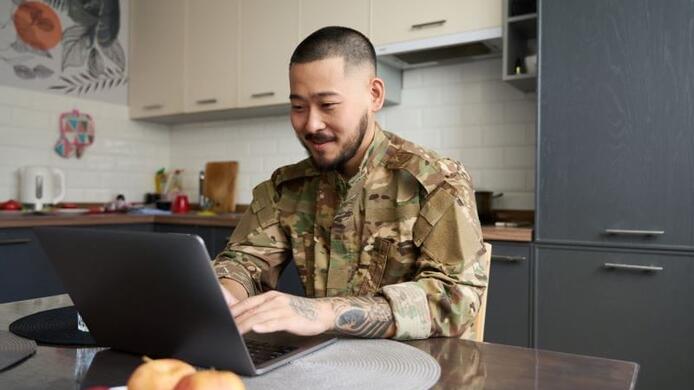UMass Global offers a wide variety of degree programs for active military and veterans. Explore your options and find a degree that fits you.

Navigating the world of military spouse education benefits may seem daunting, but it opens doors to numerous opportunities for personal and professional growth. These benefits are designed to support the unique challenges faced by military families including the need for financial assistance and flexibility. From tuition assistance programs to scholarships and grants, understanding your options can help you make informed decisions about your educational journey.
To learn more about the types of veteran and military spouse education benefits and how to access them, watch our video or read more.
Education Benefits Eligibility
Understanding spouse education benefit criteria is crucial for effectively planning and applying for educational opportunities. Luckily, the primary requirement is being the spouse of an active duty, guard, reserve, or retired military member. You must also have received your high diploma or GED. However, some education benefits have more specific eligibility requirements like pay grade, degree type, and career aspiration. This is why it’s important to thoroughly review the requirements of the specific program you are applying for.
Types of Military Spouse Education Benefits
Military spouses have access to a range of education benefits designed to support their academic and professional development such as the My Career Advancement Account (MyCAA) program, Military Spouse Career Advancement Accounts (MyCAA) Scholarship Program, and the Post-9/11 GI Bill Transfer of Benefits. The aim is to alleviate the financial burden of education and empower military spouses to pursue their academic and career goals despite the challenges of military life.
Department of Defense and Veterans Affairs Programs
The Department of Defense offers one primary financial program and three career-related programs. The My Career Advancement Accounts (MyCAA) program provides up to $4,000 in financial assistance for military spouses pursuing licenses, certificates, certifications, or associate degrees in portable career fields.
Eligibility for MyCAA includes spouses of active-duty service members in pay grades E-1 to E-6, W-1 to W-2, and O-1 to O-3, as well as spouses of National Guard and Reserve members. This financial aid program is essential in helping spouses overcome the financial barriers to educational advancement.
The DoD’s career-related programs were developed to help military spouses find employment opportunities and support career growth. The Military Spouse Preference (MSP) program provides employment preference for military spouses in the federal government hiring process. Additionally, the Military Spouse Employment Partnership (MSEP) connects military spouses with hundreds of partner employers who have committed to recruit, hire, promote, and retain military spouses in their workforce.
Lastly, the Spouse Education and Career Opportunities (SECO) program offers comprehensive services including the MySECO website and a career center. The MySECO website provides a wealth of virtual tools and resources aimed at helping military spouses achieve their educational and career goals. At the Military OneSource SECO Career Center, certified career counselors offer comprehensive counseling services at no cost, aiding in career planning and educational guidance.
Veterans’ Affairs Programs
Veterans Affairs offers a range of financial aid-based educational benefits tailored to support the spouses and dependents of retired military members. The Dependents Education Assistance (DEA) Program provides up to 36 months of veteran spouse education benefits. This financial aid covers costs of degree and certificate programs, apprenticeships, and on-the-job training, including refresher courses.
Furthermore, the Marine Gunnery Sgt. John David Fry Scholarship (Fry Scholarship) offers up to 36 months of education benefits to the surviving spouses and children of service members who died in the line of duty post-September 10, 2001. Eligible surviving spouses can use these benefits within 15 years from the service member's death. This scholarship can be used to cover full tuition for public schools, assistance for private and abroad schools, and books and supplies.
Finally, Post-9/11 GI Bill Transferability allows active-duty military members with at least six years of service to transfer remaining GI Bill benefits to their spouses. Keep in mind you will be obligated to do an additional four years of service after the transfer. Additionally, through the Yellow Ribbon Program in the Post-9/11 GI Bill, eligible veterans and their dependents can receive extra funding to cover the costs of education and training programs at participating institutions. This program bridges the gap between the base tuition and fees charged by a school and the amount covered by the GI Bill, potentially minimizing or eliminating out-of-pocket expenses for qualifying individuals.
State-Provided Military Education Benefits for Spouses
State-provided military education benefits are designed to assist families in paying for higher education while they reside there, ensuring spouses have the opportunity to pursue their educational and career goals without undue stress.
In several states, educational benefits are extended to the spouses of deceased, missing in action (MIA), prisoners of war (POW), and disabled veterans. These benefits may cover tuition, fees, and other educational expenses. Oftentimes these education assistance benefits come in the form of scholarships and grants through their Education Departments or Veterans Affairs programs. For example, In California, the CalVet program provides College Tuition Fee Waiver for Veteran Dependents different types of college tuition fee waivers, specifically for spouses and children.
Additionally, this financial aid is often available both at the spouse's home state and the state where the service member is stationed, as well as the service member’s official home of record. Be sure to research non-resident related veteran education benefits to utilize this option.
It’s important to note, the extent of tuition assistance can vary widely. Some states offer up to 100% assistance, while others provide targeted support for the spouses of disabled veterans, or those killed in the line of duty. It is crucial for military spouses to check with their state's veterans affairs office or education department to understand the specific benefits available and the eligibility criteria.
Applying for Veteran and Active-Duty Spouse Education Benefits
Individuals applying for military and retired military spouse education benefits will need to fill out several specific documents to access assistance. These documents may include the application for the Transfer of Education Benefits under the Post-9/11 GI Bill or the VA Form 22-1990e or 22-5490. Other documents requested may include marriage certificates, transcripts, specific degree programs, and any additional forms required by the specific branch of the military or the Department of Veterans Affairs. It's important for military spouses to carefully follow the application process and provide all necessary documentation to ensure you are maximizing the benefits available to you.
Common Obstacles of Accessing Education Benefits
Military spouses can face challenges when attempting to access military spouse education benefits. One of the main obstacles is navigating the complex web of eligibility requirements, application processes, and documentation. The bureaucratic nature of these procedures can be overwhelming and time-consuming, adding an additional layer of difficulty for military spouses who are already juggling multiple responsibilities.
The limited availability of resources in certain locations can also make it difficult for military spouses to find suitable educational opportunities that align with their career goals and interests. In some cases, military bases may not have universities nearby. Moreover, the transient nature of military life can also impede access to consistent quality education. Frequent relocations can disrupt academic pursuits, making it challenging for military spouses to maintain continuity.
Benefits of Online Degree Programs for Military Spouses
Online degree programs offer numerous benefits for military spouses. They provide flexibility, allowing spouses to study at their own pace and schedule, accommodating the demands of military life. This flexibility is particularly important for military spouses, as they are often taking care of their families and managing household tasks, while also supporting their partners who are serving in the military. By being able to study online, military spouses can fit their coursework into their busy schedules, ensuring that they can pursue their education without sacrificing other commitments. At UMass Global, our self-paced and competency-based education programs are perfect for busy active-duty and veteran spouses.
Additionally, online programs often have a wide range of degree options, ensuring that spouses can pursue their desired field of study. Whether they are interested in business, healthcare, education, or any other field, there are online degree programs available that cater to their interests and career goals. This variety allows military spouses to choose a program that aligns with their passions and aspirations, enabling them to gain the knowledge and skills they need to succeed in their chosen profession. This is particularly beneficial when seeking to access employment opportunities via MSEP.
Unlock Your Future With UMass Global
For military spouses, there are numerous programs available to help minimize financial barriers, making higher education more accessible. For those looking to further maximize their education benefits, UMass Global is the right choice, offering tailored programs that align with the unique needs of military families. In support of our troops, UMass Global has specific pathways within the Master’s of Business Administration and Leadership degree programs where military training converts to course credits. We also reduce application fees for military spouses and dependents. Request more information or apply today.





